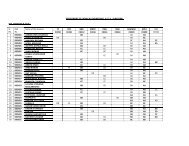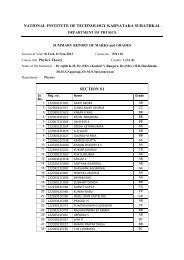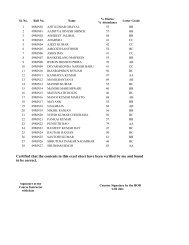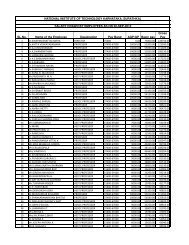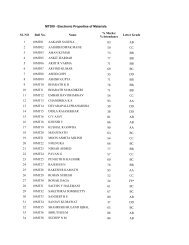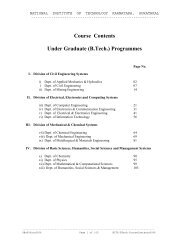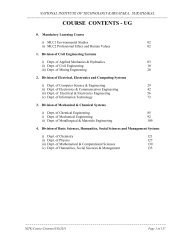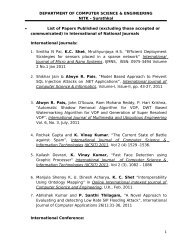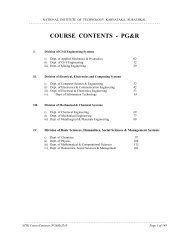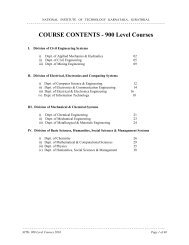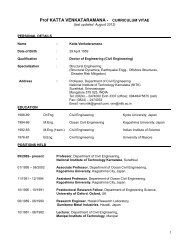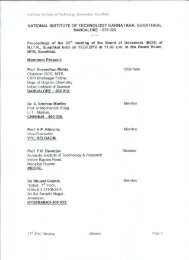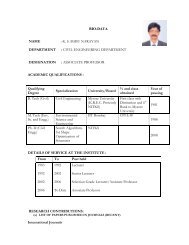course contents - ug - National Institute of Technology Karnataka
course contents - ug - National Institute of Technology Karnataka
course contents - ug - National Institute of Technology Karnataka
You also want an ePaper? Increase the reach of your titles
YUMPU automatically turns print PDFs into web optimized ePapers that Google loves.
NATIONAL INSTITUTE OF TECHNOLOGY KARNATAKA, SURATHAKAL<br />
------------------------------------------------------------------------------------------------------------------<br />
CH412 BIOREACTOR DESIGN (3-1-0) 4<br />
Microbiology. Characterization, Classification and enumeration <strong>of</strong> microorganisms, environmental and<br />
industrial microbiology, ecology, microbiology <strong>of</strong> soil and air, Laboratory techniques in microbial<br />
operations. Control <strong>of</strong> microorganisms by physical and chemical methods, biochemistry. Microbial<br />
metabolism. Mechanism and kinetics <strong>of</strong> enzyme catalyzed reactions. Enzyme technology. Bioreactor<br />
design.<br />
Biochemical Engineering Fundamentals, J.E.Bailey and D.F. Ollis, 1977, McGraw Hill.<br />
Biochemical Engineering, S. Aiba, 1965,Acadmic Press.<br />
CH413 FERTILIZER TECHNOLOGY (3-0-0) 3<br />
Introduction. Production, transmission and storage <strong>of</strong> ammonia thro<strong>ug</strong>h various processes and raw<br />
materials; ammonia salts; nitric acid and nitrates. Production <strong>of</strong> Urea thro<strong>ug</strong>h various Processes.<br />
Phosphatic Fertilizers. Potash fertilizers. Compound fertilizers.<br />
Fertilizer Manual, No. 13 - Development and Transfer <strong>of</strong> <strong>Technology</strong> series, United Nations Industrial<br />
Development Organisation, 1980.<br />
CH414 FERMENTATION TECHNOLOGY (3-0-0) 3<br />
Introduction, fermentors-principles and design, Manufacture <strong>of</strong> alcohol, pencillin, vitamins and other<br />
products.<br />
Fermentation <strong>Technology</strong>, Whitaker.<br />
Biochemical Engineering Fundamentals, J .E .Bailey and D. F. Ollis, 1997, McGraw Hill.<br />
CH415 PETROLEUM ENGINEERING (3-0-0) 3<br />
Introduction. Composition and evaluation <strong>of</strong> properties <strong>of</strong> crude oil and refinery products.<br />
Refining <strong>of</strong> petroleum. Types <strong>of</strong> pipe still furnaces used in refineries and their design consideration.<br />
Cracking processes. Rebuilding processes. Product treatment processes.<br />
Robert A. Meyers, Hand Book <strong>of</strong> Petroleum Refining Processes, McGraw Hill Book Co., l986.<br />
Bhasker Rao B.K,. Modern Petroleum Refining Processes, Oxford & IBM Publishing Co., 1984.<br />
CH416 MECHANICAL DESIGN OF PROCESS VESSELS (3-0-0) 3<br />
Mechanical design <strong>of</strong> cylindrical vessels and closures for internal and external pressure - design <strong>of</strong> tall<br />
vertical vessels - design <strong>of</strong> horizontal vessels - design <strong>of</strong> high-pressure vessels. Mechanical design and<br />
drawing <strong>of</strong> various equipments.<br />
All designs shall be in conformity with respective IS codes.<br />
Unfired pressure vessel code IS-2825, IS-803.<br />
I.S. specification for shell and tube type heat exchanger IS- 4503.<br />
Hand book <strong>of</strong> Chemical Engg. - Peery. VI edition, McGraw Hill, 1984.<br />
CH440 PRACTICAL TRAINING / EDUCATIONAL TOUR 2<br />
This <strong>course</strong> is a 2 credit <strong>course</strong>. A student may complete the training or educational tour before the<br />
beginning <strong>of</strong> 7th semester (or as stipulated by DUGC) and register for it in 7th Semester. The duration<br />
and the details shall be decided by the faculty advisor, with approval from DUGC.<br />
CH449 MAJOR PROJECT-I (0-0-3) 2<br />
The Students jointly or individually will be assigned an experimental or theoretical problem, to be carried<br />
out under the supervision <strong>of</strong> a guide. The project has to be completed in the VI & VII semester. The<br />
students should complete the preliminary literature survey and experimental set up in the VI semester.<br />
Their work will be reviewed and evaluated.<br />
---------------------------------------------------------------------<br />
NITK-Course Contents(UG)2010 Page 87 <strong>of</strong> 134



